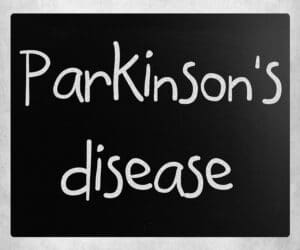
Parkinson’s disease begins when the brain’s neurons in charge of movement become impaired or even die off. Unfortunately, scientists have not discovered what makes these specific nerve cells die off so prevention for Parkinson’s is hard to establish. The best way to combat it is early detection that can lead to treatment and management of symptoms.
Symptoms of Parkinson’s disease can be different among individuals and can come on at differing levels of progression. Some the most common symptoms many people recognize right away are:
Tremor
From a slight shaking to uncontrolled movement in the hands, arms, legs, jaw and head, tremors are a very visible sign of the onset of Parkinson’s disease.
Stiffness
If your parent has complained to you or your senior care provider about feeling stiff, especially in his torso or limbs, it could be Parkinson’s developing.
Slowness of Movement
If you or your senior care provider have noticed that your elderly parent is moving a lot slower in all areas, he might be beginning to feel the symptoms of Parkinson’s disease.
Recent Falls
Impaired balance and coordination, brought on by Parkinson’s, can cause your parent to experience more falls by not being able to navigate uneven ground or surfaces. A simple miss-step here or there doesn’t mean he’s struggling with balance, but repeated falls or stumbling steps may signal his coordination is not functioning properly.
There are also other symptoms of Parkinson’s disease that either you or your senior care provider have noticed. If your parent is struggling with any of these symptoms, as well as the four major symptoms, they may be further indication of a possible Parkinson’s disease diagnosis in your parent’s future.
- New emotional disorders such as depression or anxiety.
- Difficulty in swallowing, chewing, or eating in general.
- Speech problems such as slurred speech or a reduced ability to speak loudly and clearly.
- Urinary problems and constipation.
- Sleep disruptions.
Early symptoms are often subtle and seem to mimic many of the physical limitations that occur when a person gets older. Some things that you and your senior care provider can keep an eye out for to determine if Parkinson’s is a concern for your parent are:
- Difficulty getting out of a chair.
- Poor handwriting that is no longer legible.
- Speaking very slowly and softly.
- His face lacks expression or animation.
- His walk has changed – he’s taking quicker, smaller steps while leaning forward.
After talking with your parent about your concerns and meeting with his senior care provider to get her input, if you feel he is experiencing enough symptoms that he might have Parkinson’s disease, set up an appointment to meet with a neurologist to discuss diagnosis and treatment for his symptoms.
Source: https://www.nia.nih.gov/health/parkinsons-disease#
If you are considering senior care in Katy, TX, for an aging loved one, please call the caring staff at At Your Side Home Care. We will answer all of your senior care questions. Call today: (832) 271-1600.
Our Certified Nurse Aides, 24-Hour Live-in Assistants and Home Health Aides are available 24 hours a day, 365 days a year. We also provide the security and confidence of 24-hour Telephone Assistance, so fast, reliable help is always available when it's needed. To learn more about our homecare services see our homecare services page.
Different people need different levels of homecare. To meet the requirements of our clients, At Your Side Homecare maintains consistent staffing levels of caring professionals. Homecare service is available for as little as a few hours a week, or as many as 24 hours a day, seven days a week
- Home Care Provides Respite for Family Caregivers - April 12, 2024
- Companion Care at Home Helps to Build Meaningful Relationships - April 4, 2024
- Senior Home Care Supports Long-Distance Caregivers - April 4, 2024




